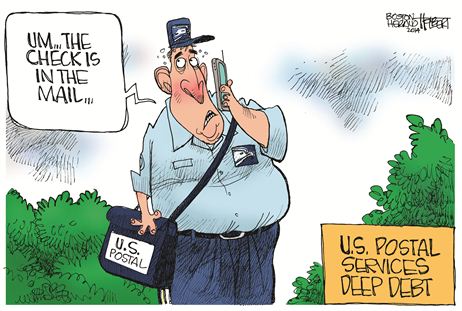It’s not often that I agree with the Washington Post, but a government-run monopoly is not the best way to get mail delivered.
 Moreover, it’s not often that I agree with the timid (and sometimes reprehensible) Tory-led government in the United Kingdom, but they just put the Royal Mail into the private sector. And that’s something deserving of loud applause.
Moreover, it’s not often that I agree with the timid (and sometimes reprehensible) Tory-led government in the United Kingdom, but they just put the Royal Mail into the private sector. And that’s something deserving of loud applause.
Here’s a slice of the big news from the Financial Times.
The goal of privatising Royal Mail had defeated governments for 40 years. …Even prime minister Margaret Thatcher balked at the political risk of selling off a public service that carried the Queen’s head on its stamps. This time, the legislation went through parliament.
My Cato colleague, Chris Edwards, is suitably impressed.
Here’s some of what he wrote for Cato-at-Liberty.
Britain privatized its Royal Mail in 2013, proceeding with an initial public offering of shares that raised about $2.7 billion. …privatization in Britain has been hugely successful. Prime Minister Cameron should be applauded for having the guts to build on the privatization reform legacy of Thatcher, Major, and Blair. Meanwhile on this side of the pond, Republican Darrell Issa is having trouble getting his own nominally conservative party to accept even small changes to the broken government postal system.
Not surprisingly, some folks in Washington think we should move in the wrong direction by retaining the monopoly and allowing the Postal Service to enter new lines of business.
In this interview with Neil Cavuto, I explain why the Postal Service should be unleashed – but only after getting weaned from the taxpayer teat.
Recommended
You’ll notice that I took the opportunity to explain that many poor people can’t afford banking services in part because government “anti-money laundering” rules impose very high costs on banks.
And since I’ve already mentioned that I have strange bedfellows at the Washington Post and UK government on the issue of postal privatization, I may as well note that the World Bank agrees with me about the poor being disadvantaged by these ill-advised financial regulations.
Let’s close with a good cartoon by Jerry Holbert.

It’s not as good as his classics about Obamacare, sequestration, big government, and Patty Murray’s budget, but obviously very appropriate for today’s topic.
P.S. In there was a contest for government stupidity, the Japanese might be front runners.
No, I’m not talking about their bizarre policy of regulating coffee enemas.
Instead, I’m baffled by the notion of government-funded dating. I’m not joking. Check out these excerpts from the British press.
The Japanese government is funding matchmaking events in a desperate attempt to boost a birth rate that has halved over the past six decades. …The support of marriage – and the active encouragement of young people to settle down – is regarded by government policy-makers as a key strategy for boosting the nation’s birth rate. …Matchmaking events organised by local authorities, where young singles are introduced to one another in romantic settings, are becoming increasingly common in areas such as rural Kochi, a prefecture around 500 miles west of Tokyo.
By the way, Japan does have a severe demographic problem.
And when you mix falling birthrates and increasing longevity with a tax-and-transfer welfare state, the results are catastrophic.
longevity with a tax-and-transfer welfare state, the results are catastrophic.
But the right way to deal with that problem is with genuine entitlement reform, not another bound-to-fail government-run version of Match.com.
P.P.S. If you like making fun of foreign governments, here are some more examples.
Taxpayer-financed friends for mass murderers in Norway.
Spending 800,000 euro to collect 25,000 euro of tax in Germany.
Giving welfare handouts to foreigners in the United Kingdom.
Remember, nothing is too stupid for government.
























Join the conversation as a VIP Member